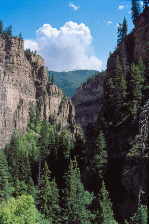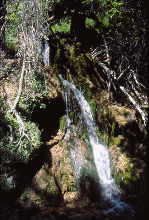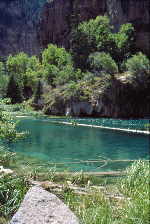| thinfilmmfg.com
|
While Americans are historically skeptical of government power, we are prone to forget our fears when faced with some real or imagined external menace. This short history of the FBI is a timely reminder of the conflict between secretive intelligence gathering and a free society.
Dongbu Electronics became one of the top ten sources of traffic to this site last week. They linked to an item about their CMOS image sensors from their Press Room page. Thanks for the link, and welcome to visitors who reached us that way.
Election season is coming. Many states have primaries in early September. The general election in early November includes votes for all members of the US House of Representatives.
In 2000, George Bush's official margin of victory in Florida was 537 votes. Just 537 votes out of several million cast. Non-presidential elections usually attract fewer people, so your vote will be even more important this time.
Democracy only works if citizens participate. A Google search for "vote" and your state should help you get started.
Now we're all in trouble. The major parties have discovered spam in a big way. Mike McCurry, former press secretary for President Clinton, and Larry Purporo, a former deputy chief of staff for the Republican National Committee, had an op-ed piece in today's Boston Globe singing the praises of unsolicited political email.
They note with approval the example of Bill Jones, who "acquired the e-mail addresses of more than a million potential California voters." Well, I was on that list, and I don't vote in California. There are several thousand political jurisdictions in the US, each with dozens of political candidates. If just half of them use the same list Bill Jones did, I'll receive thousands of emails advertising products (candidates) that I can't use (vote for) even if I wanted to. How is that different from the unsolicited commercial email I get already?
They compare unsolicited email to direct mail, radio, and other forms of conventional advertising, but claim that email is better because it's cheaper. That's exactly why spam is universally detested. The sender pays practically nothing, and therefore has no incentive to spend money targeting their list to people who actually might be interested. The recipient bears the cost in bandwidth, disk space, and time to get rid of it. Deleting one email may be easy, but extracting solicited mail from hundreds or thousands of pieces of junk is much more difficult.
For that reason, spam isn't "just a cheaper form of direct mail." It's the electronic equivalent of dumping trash on someone's lawn. If a candidate dumped trash on my lawn, I wouldn't vote for him, I'd encourage my friends to vote against him, and I might actively work for his opponent's campaign. And that's exactly how I'll respond to unsolicited political email.
McMurry and Purporo argue that the decision to receive political email should be left to the voter. I agree. I've decided that I don't want any of it. Why should I have to individually explain that to every single one of the thousands of candidates who might somehow obtain my email address?
I met with an interesting new company called Straatum at Semicon West. They're a division of Scientific Systems focusing on fault detection and classification. Their web site includes an interesting white paper on fault detection and run-to-run process control.
I mostly try to avoid terrorism and international politics in this space. Plenty of other sites cover the topic, and I don't feel I have much to add. This article got to me, though. Humorist Larry Miller writes a not even slightly funny article about his visit to hospitals in Israel.
(Link by way of Mike Sanders's Keep Trying blog.)
Those who've been reading for a while know that I've been participating in a bout of extreme writing, targeting a total of 62,000 words between July 1 and August 31. Regular readers also know that I've fallen way behind, with only 30,870 words and only two weeks to go.
I've now decided to drop out, but not because I'm behind. With the rough draft of the Venice project done, as I mentioned yesterday, I need to shift my focus to rewriting instead of new material.
Didn't get a whole lot of writing done over the weekend, which I mostly blame on the heat. I did crack the 30K mark, though. 1050 words since my last update, 30,270 since July 1.
I'll probably be starting on the second draft of the Venice project soon. That will involve sorting through what I have so far, putting it in some kind of (hopefully) coherent order, and writing new material as needed to fill the (probably enormous) gaps. All of that will take some time. My current goal is to be ready to start sending it around to publishers by the end of the year. That's probably a bit ambitious. We'll see.
Photos from my trip are back. Yeah, I know digital is faster, but my beloved SLR uses film. These are from the Hanging Lake Trail, off Glenwood Canyon in the White River National Forest. The white cloud in the first one is, I think, smoke from a minor forest fire that flared up that afternoon.



(Click images for larger versions.)
You may not know his name, but there's a good chance that Chesley Bonestell helped define your mental image of space. His photorealistic imagination and detailed research gave us the best representations of planets and spacecraft available before the space program. Heinlein wrote, "Mr. Bonestell knows more about the surface of the moon than any other living man."
(Link by way of Arts & Letters Daily.)
Flooding in Dresden has forced the evacuation of more than 30,000 people. The AMD and Infineon fabs in the area are reportedly on high ground well away from the overflowing Elbe River. I hope any readers from the area are safe and dry.
It took about twice as long as I expected, but I finally finished up my Semicon West report last night. For more show coverage, see my blog entries from that week.
I also finished up an article on writing motivation for Vision, the Forward Motion community newsletter. The editor tells me she'd like to hold it for the November/December issue. I'll post a link once it's online.
Online exchanges were hailed as the Internet boom's biggest innovation, then derided as its biggest bust. But some of them are actually succeeding. Business 2.0 looks at the differences between exchanges that work and those that don't.
(Link by way of TechDirt.)
Photographers Galen and Barbara Rowell were killed in a private plane crash on Sunday. Mr. Rowell's ability to capture the interplay of light and form helped me understand what I want to do in my own photography.
2620 words in the last few days. 27,270 since July 1.
It's supposed to be very hot and humid again today, so I'll probably camp out at the public library to work. That worked well yesterday--it got me away from my Internet connection and related distractions as well as the heat.
"Accounting error" is a benign phrase, implying that a company just made a numerical mistake somewhere, or maybe misinterpreted some complex detail of accounting principles. It could happen to anyone. Let he who has never had trouble balancing his checkbook or filling out his tax return cast the first stone.
And then we have the Enrons, Tycos, and WorldComs of the world. Yesterday, WorldCom said it found an additional $3.3 billion dollars in improperly recorded earnings. There's a different word for that kind of behavior. It's called fraud.
I think it's important for everyone, from financial regulators to individual investors, to be clear on the difference. Accounting rules are complex. A company, like an individual, can be overly aggressive and can make honest mistakes. The appropriate response is for the company to clean up the books, pay whatever fine might be appropriate, and move on with its business.
Fraud is something else. When people have deliberately misrepresented the financial position of a company, when people have enriched themselves at the expense of their fiduciary duty to shareholders, the appropriate response is for those people to go to jail.
Only by drawing a bright line between aggressive accounting and fraud, and by demonstrating that fraud will not be tolerated, can companies and financial markets begin to put the recent scandals behind them.
I'm writing again. I haven't completely dug out from my trip, but I can find enough of my desk to start to get work done. 4000 words since my last update, 24,650 since July 1.
The Chicago heat wave of 1995 killed seven hundred thirty-nine people, most of them elderly and poor. Yet, as sociologist Eric Klinenberg found, demographically similar neighborhoods had dramatically different fatality rates. His look at the reasons why suggests that many deaths due to "acts of God" are not as inevitable as they seem.
Altavista continues to supply bizarre search results for your amusement. This time, someone reached this site using the keywords: "sandals or abolitionist or prorated or publications or breakthroughs."
I'm not singling Altavista out for abuse, by the way. They're singling themselves out by consistently bringing users here for no apparent reason. With other search engines, it's much clearer what the person might have been looking for and why they ended up here.
The traveler has returned. It will take me a little while to get caught up, but things are moving forward again.
For those who care, an aikido camp scrapbook is online.
Aikido retreat continues. Yesterday was a light day, which I mostly spent hiking in the White River National Forest. Specifically, I was in Glenwood Canyon, which is also home to what may be one of the most scenic stretches of interstate highway in the US.
| This site is Copyright ©2001-2002 by Thin Film Manufacturing. All Rights Reserved |